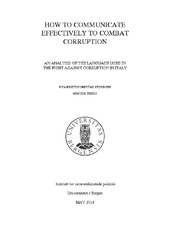How to communicate effectively to combat corruption. An analysis of the language used the fight against corruption in Italy.
Master thesis
Permanent lenke
https://hdl.handle.net/1956/18791Utgivelsesdato
2018-06-30Metadata
Vis full innførselSamlinger
Sammendrag
In spite of the difficulties related to measuring corruption, both international surveys and national statistics indicate that corruption remains a serious problem in Italy, resilient to time as well as political changes. The need to intensify the fight against corruption on a cultural level is recognised in the country’s corruption prevention framework, but political science is struggling to explain the persistence of corruption in Italy. For the same reason, it has been difficult to devise a corruption prevention strategy that is effective also in the cultural realm. This thesis departs from a social constructivist standing point and, using Norman Fairclough’s Critical Discourse Analysis, sets out to analyse how language is used to sustain those aspects of Italian culture that are permissive of corruption. In doing so, it meets a request from social anthropologists who in recent years have called for more inter-disciplinary studies of the phenomenon. Eventually, the focus on language as a transmitter of culture also allows for a normative approach, and an objective of this thesis is to suggest a way forward in terms of how to communicate strategically in order to change the cultural premises for corruption in Italy.
